College of Science, Engineering & Technology
Prof Usisipho Feleni takes Top Woman Leadership Award in the STEM discipline
Unisa’s Prof Usisipho Feleni won the Standard Bank Top Woman Leader in the STEM (Science, Technology, Engineering and Mathematics) discipline, sponsored by Wipro, at the Standard Bank’s 20th Annual Top Women Awards, themed My Africa. The awards celebrate female leaders who have demonstrated exceptional performance in the scientific or technology fields.

Prof Usisipho Feleni
Feleni is an Associate Professor and the Applied Electrochemistry Thematic Area Leader at the Institute for Nanotechnology and Sustainability (iNanoWS) in the College of Science, Engineering and Technology (CSET). Her research expertise is on electrochemical biosensors, electrocatalysis/catalysis for monitoring disease biomarkers (pathogens for SARS-CoV-2), pharmaceutical contaminants in water, and carbon capture.
Feleni explains that being awarded Top Woman Leader in the STEM disciplines means her contribution to the STEM area in capacity development, community engagement, research impact in South Africa and innovative research ideas is recognised and is making a significant impact in the field of science. Furthermore, she states that the award reflects on the number of master’s and PhD graduations, the research grants obtained nationally and internationally, collaborations and the research fellowships that enabled her to gain skills and expand her research expertise. She adds: "This award will assist in the visibility of the research work we do and the impact this will have on the university’s alignment, the United Nations (UN)’s Sustainable Development Goals, and in addition, the Africa Agenda 2063 aspirations."
Years of diligence
Feleni states that she was an outstanding performer during high school, particularly in science. She became the first in her family to go to university. She continues to detail the inspiration behind her achievements: "I was inspired by my personal story of losing a loved one due to HIV in 2006. I wanted to make a difference by ensuring that the lives of women/patients taking medication are managed properly. Therefore, I was introduced to research work in electrochemical biosensors during my BSc and BSc Honours degrees, MSc in Nanoscience as well as PhD in Chemistry, where I combined the electronics of novel nanomaterials and the bioelectrochemistry of hepatic enzymes (enzymes that occur in the liver), to develop biosensors that determine the rate of the metabolism of anti-retroviral drugs." Feleni argues that this research is essential in clinical diagnostics, as biosensors provide the real-time information doctors require to prescribe appropriate dosages to avoid drug toxicity.
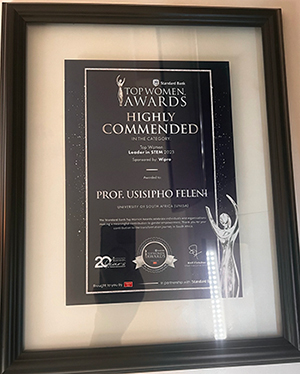
Prof Usisipho Feleni's award certificate
Regarding her proudest accomplishments, Feleni states that it is performing research that contributes to the improvement of women’s health through the development of easy-to-use and susceptible diagnostic sensors, such as the biosensors for signalling breast cancer drugs and anti-retroviral drugs, particularly nevirapine, which is taken to prevent mother-to-child transfer. She adds that another aspect she is proud of is her new work that seeks to contribute to solving the worldwide challenge of climate change, Covid-19 pandemic and anti-diabetes through developing protocols for monitoring and converting carbon capture and signalling contaminants in wastewater.
Regarding her current pursuits, she explains that she is currently working on developing photoelectrochemical/spectroelectrochemical dual systems that utilise nanomaterials as platforms for water management improvement and reducing the global warming caused by climate change.
Encouraging young women to pursue careers in STEM
Feleni says encouraging women to pursue careers in STEM can be done by providing support that can spark their curiosity, interest and confidence in science. She stresses that this must start at primary and high school levels.
In addition, she points out that there must be an intentional effort to expose the next generation to science and connect them with role models and mentors who can guide and inspire them from as early as primary school. She remarks that there must be enabling platforms for the next generation to obtain research scholarships and strategies towards collaborating on national/international funding opportunities.
Feleni hopes to continue developing research that solves societal challenges and act as a role model to the next generation by giving them hope and confidence to take up spaces in the science field. She concludes by stating that her other vision is to develop mobile exhibitions for disadvantaged rural schools.
* By Godfrey Madibane, Acting Journalist, Department of Institutional Advancement
Publish date: 2023-11-29 00:00:00.0

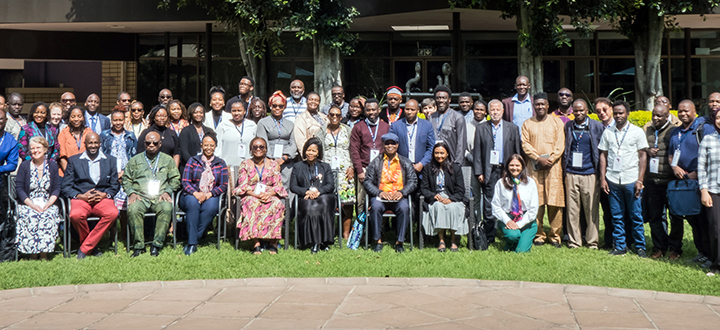 Social policy in post-Covid Africa: In search of an inclusive and equitable architecture
Social policy in post-Covid Africa: In search of an inclusive and equitable architecture
 Education in pursuit of social justice
Education in pursuit of social justice
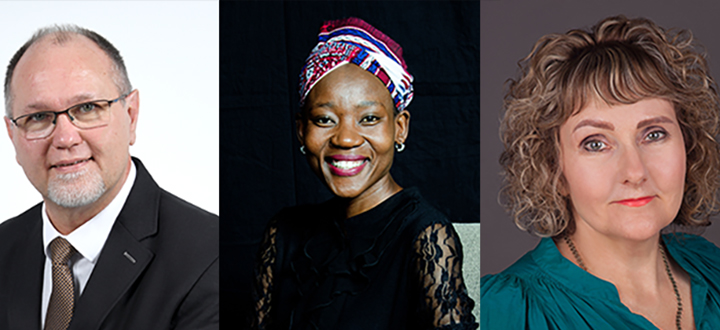 Unisa shows that developing countries are equal partners in research management and administration capacity development
Unisa shows that developing countries are equal partners in research management and administration capacity development
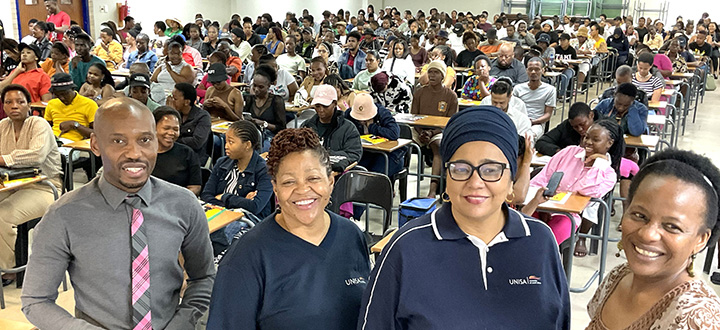 Unisa KZN Career Fair bridges the gap between students and employers
Unisa KZN Career Fair bridges the gap between students and employers
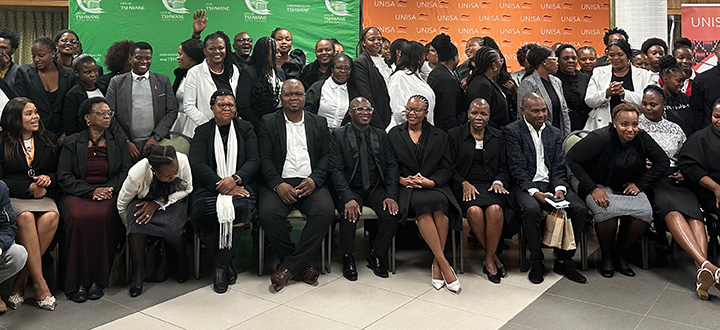 Unisa academics join hands to celebrate World Social Work Day
Unisa academics join hands to celebrate World Social Work Day